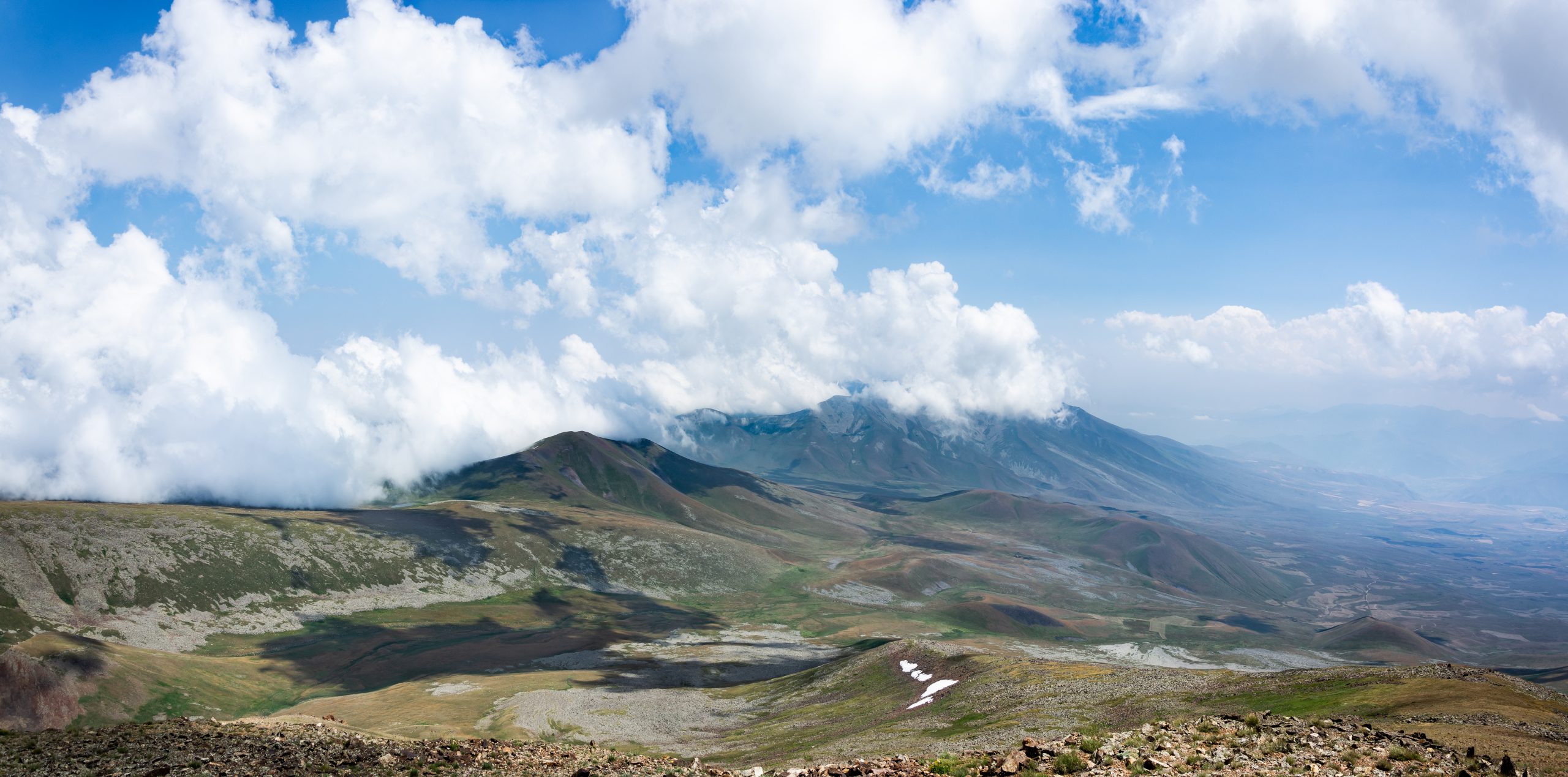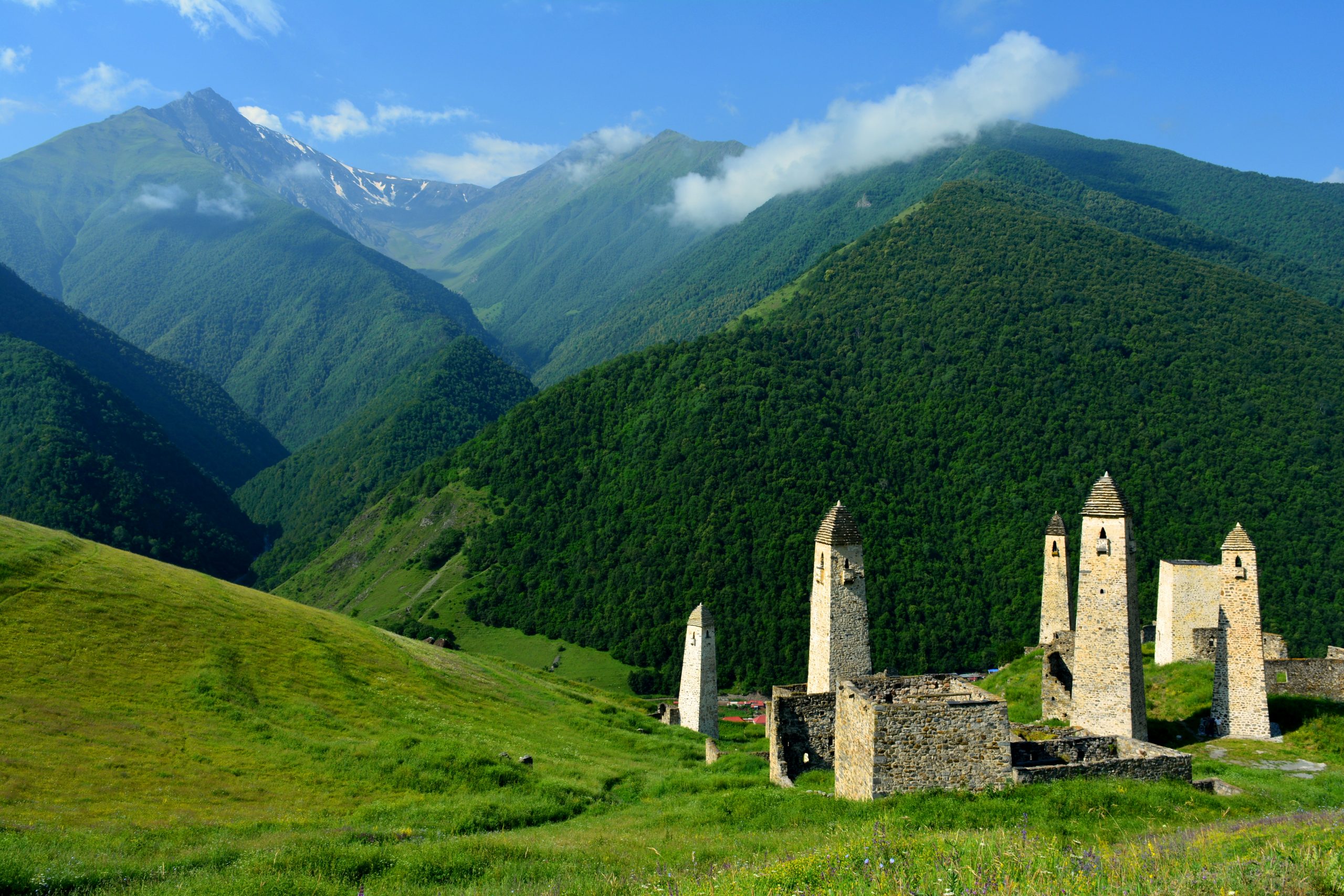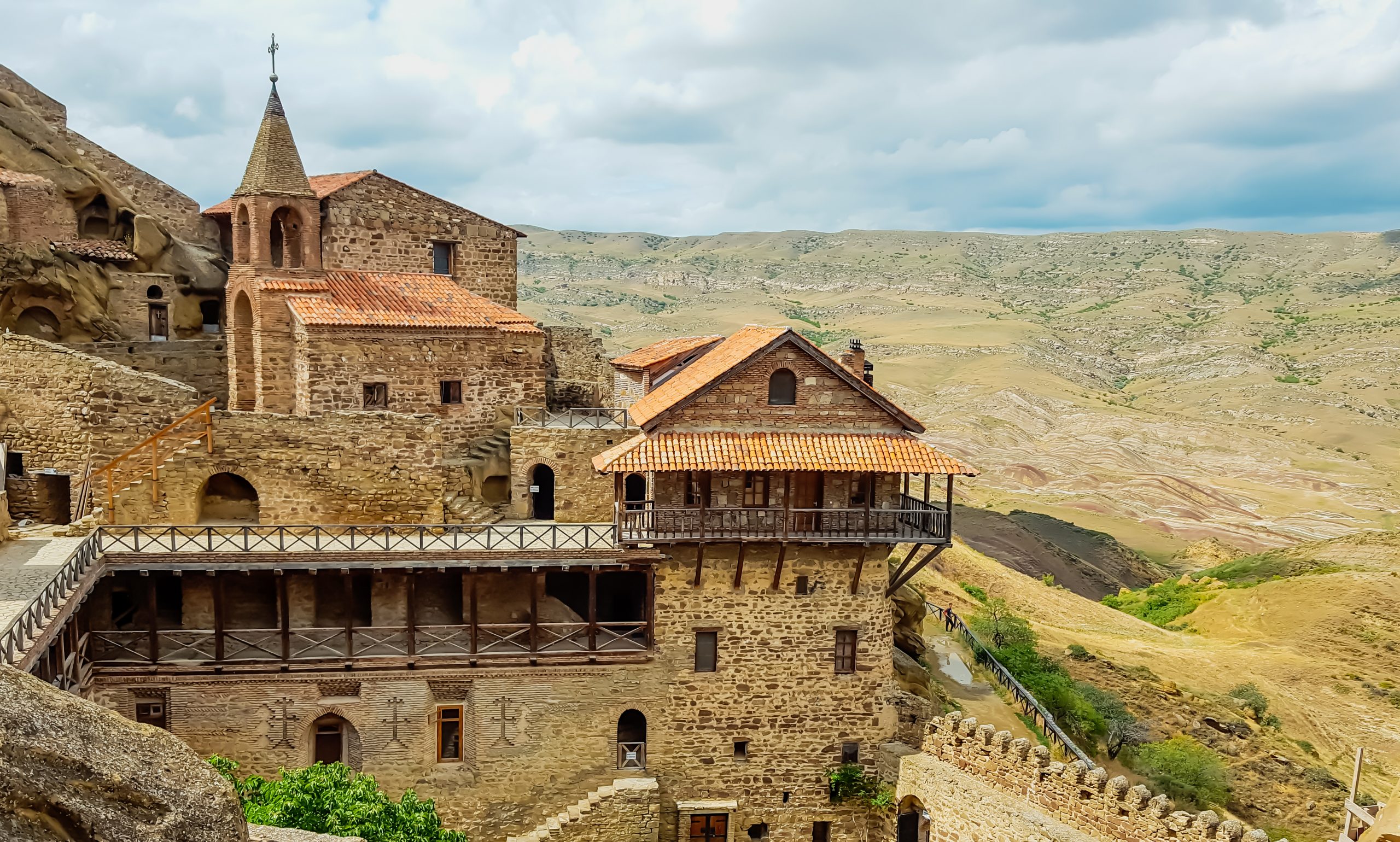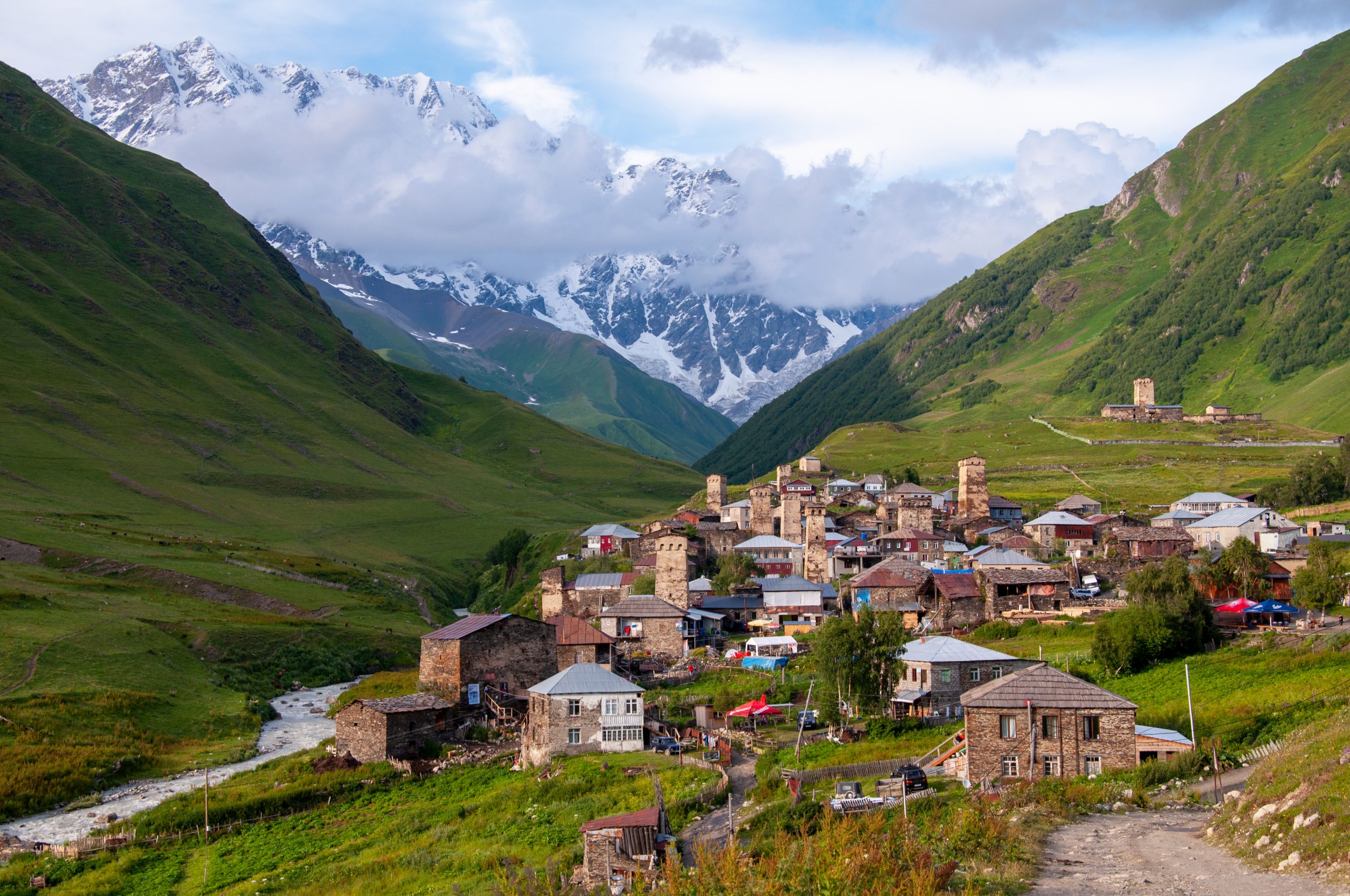Strategic Analysis Caucasus Brief
Bi-weekly review (2.- 16.5. 2021)
Tomáš Baranec and Marina Avram
Armenia

The landscape of Syunik province from Mt. Tsghuk. Photo: Avetis Keshishyan/ Shutterstock.com
Azerbaijan army violated the Armenian border in Syunik
On May 12, the Azerbaijani armed forces crossed the border in the area of Sev Lich (Black Lake), advancing 3.5 kilometres into the internationally recognised territory of Armenia. Armenian Prime minister Nikol Pashinyan stated that by doing that, Baku is trying to establish control over the lake.
On May 13, the Armenian Defense Ministry reported that the Azerbaijani Armed Forces, “under the pretext of clarifying the borders, undertook another attempt to infiltrate the sovereign territory of Armenia” trying to advance their positions in the Vardenis region (Gegharkunik region) where they were stopped by Armenian Army which demanded that the Azerbaijani troops retreat immediately to their initial positions.
“This is a planned provocation from Azerbaijan. They (Azerbaijani servicemen) have fake maps, which supposedly should confirm that the lake belongs to them, but these are obviously fake documents. The Azerbaijani Armed Forces must return to the positions from which they began to advance,” said Pashinyan.
On May 14, following several days of silence, the Ministry of Foreign Affairs of Azerbaijan announced that Azerbaijani border guards were just changing their deployment in the Lachin and Kelbadjar Districts bordering on Armenia.
Meanwhile, on May 13, Armenia asked the Moscow-led Collective Security Treaty Organization (CSTO) to respond to Azerbaijan violating its sovereign territory. “As the situation develops, if necessary, actions will be taken under the provisions of the Collective Security Treaty and the CSTO Charter,” responded CSTO in its statement.
On Friday, May 14, Yerevan said that Azerbaijan had failed to fulfil a promise in full to withdraw troops that had crossed the border in a disputed incident and that it had sought Russia’s military help. “Yesterday, an agreement was reached that today Azerbaijan’s armed forces should leave Armenian territory,” the Interfax news agency quoted Armenia’s caretaker prime minister, Nikol Pashinyan, as saying at a meeting about the border. “This agreement has been partially fulfilled; there are territories that the Azerbaijanis did indeed leave. But, since the agreement was not fulfilled completely, today I have approached the President of Russia…for military assistance,” he added.
The prolonged presence of Azerbaijani forces on Armenian territory sparked a wave of contempt abroad. French President Emmanuel Macron posted in Armenian to demand the withdrawal of Azerbaijani forces from Armenian territory. “Azerbaijani armed forces have crossed into Armenian territory. They must be withdrawn immediately. I tell the Armenian people once again that France stands in solidarity with you and will continue to do so,” Macron said in a Facebook post.
Also, United States Congresswoman Jackie Speier has called on Secretary of State Anthony Blinken to pressure Azerbaijan to pull back its troops from Armenian territory. “Azerbaijan’s actions are an invasion of Armenian territory & threaten regional stability. I call on @SecBlinken to condemn Azerbaijan’s violation of Armenia’s sovereignty and pressure Azerbaijan to withdraw its forces immediately,” Speier tweeted.
Armenian-Azerbaijani talks on the situation in Syunik held on May 15 failed to yield any results, and Azerbaijani forces remained in their positions.
Sources:
- Caucasian Knot, “Переговоры по ситуации в Сюнике прошли безрезультатно (Negotiations on the situation in Syunik were unsuccessful)”, https://www.kavkaz-uzel.eu/articles/363935/,
- Caucasian Knot, “Baku explains the situation on the border with Armenia by redeployment of armed forces”, https://www.eng.kavkaz-uzel.eu/articles/55537/
- GHAZANCHYAN Siranush, Armradio.am, “Azerbaijani forces must be withdrawn: Macron posts in Armenian”,https://en.armradio.am/2021/05/14/azerbaijani-forces-must-be-withdrawn-macron-posts-in-armenian/
- BNE Intellinews, “Armenia asks Moscow-led CSTO to respond to Azerbaijan’s ‘provocative troop incursions’”, https://www.intellinews.com/armenia-asks-moscow-led-csto-to-respond-to-azerbaijan-s-provocative-troop-incursions-210532/
- Armenpress.am, “Azeri invasion of Armenia threatens regional stability – United States Congresswoman Jackie Speier”, https://armenpress.am/eng/news/1052432.html
- JAM News, “Armenia asks for regional help following escalation of border tensions”, https://jam-news.net/armenia-asks-for-regional-help-following-escalation-of-border-tensions/
- AVETISYAN Ani, OC Media, “Armenia reports Azerbaijani troops crossed border”, https://oc-media.org/armenia-reports-azerbaijani-troops-crossed-border/
- Reuters, “Armenia says Azerbaijan fails to fully withdraw after border incident”, https://www.reuters.com/world/putin-says-armenia-azerbaijan-ceasefire-must-be-observed-2021-05-14/
Kocharyan forms elections alliance with ARF and Reviving Armenia Party
Armenia’s second President Robert Kocharyan will participate in the elections in an alliance with two parties – the “Armenian Revolutionary Federation (ARF)”, also known as “Dashnaktsutyun”, and the recently established “Reviving Armenia,” which unites almost all Mayors of the Syunik region and is led by the former governor of Syunik.
Kocharyan said “professionalism, experience, diligence, discipline and love for the country” will be the guarantee for their success. He promised that the creation of tens of thousands of new jobs every year will be a priority. Everything will be done for the development of small and medium businesses”. He pledged a science-based economy and developed agriculture and noted that drastic improvement of the quality of life of all citizens will become a priority.
The signing ceremony was followed by a rally at Freedom Square in Yerevan. According to an estimate by the civil rights watchdog Union of Informed Citizens, this inaugural event drew a crowd of approximately 7900, some waving the flags of Armenia, Artsakh and the ARF.
As Benyamin Pogoshyan explained for Commonspace.eu “Kocharyan has always enjoyed close relations with ARF”, adding that he freed their jailed members immediately after his election as President of Armenia in 1998. ARF was also part of the government during his two presidential terms. As for the “Reviving Armenia”, the expert believes its key goal is “to prevent the economic and later possible political influence of Azerbaijan and Turkey in the Syunik region if communication routes are opened to connect Azerbaijan with the Nakhijevan Autonomous Republic via the Syunik”.
Sources:
- POGOSHYAN Benyamin, Commonspace.eu, “Opinion: ‘All against all” or “all against Nikol’?”, https://www.commonspace.eu/opinion/opinion-all-against-all-or-all-against-nikol
- GHAZANCHYAN Siranush, Public Radio of Armenia, “Robert Kocharyan forms alliance with ARF Dashnaktsutyun and Reviving Armenia Party”, https://en.armradio.am/2021/05/09/robert-kocharyan-forms-alliance-with-arf-dashnaktsutyun-and-reviving-armenia-party/
- The Armenian Mirror-Spectator, “Former President Kocharyan Looks and Acts Like New Candidate”, https://mirrorspectator.com/2021/05/10/former-president-kocharyan-looks-and-acts-like-new-candidate/
Two Syrian mercenaries sentenced to life in prison
A court of general jurisdiction in Armenia’s Syunik has on May 4 sentenced the two Syrian mercenaries captured during the Nagorno Karabakh war to life in prison.
Syrian nationals Yusuf Alaabet al-Hajji and Mehrab Muhammad Al-Shkheir were charged s under Article 217, Part 3, Clause 1 (terrorism committed by an organised group), Article 389 (international terrorism), Article 390, Part 1, Clause 1 (Serious breach of international humanitarian law during armed conflicts, murder), Article 390, Part 3, Clause 1 (assault on the civilian population or individual civilians) Article c, Part 3 (participation of a mercenary in armed conflicts or military actions).
The trial prosecutors said the Syrians underwent military training at a camp in northern Syria in June-September 2020 before being transported to Azerbaijan via Turkey. In addition to a fixed wage of $2,000, the recruiters also promised to pay $100 for every Armenian killed by them, according to the prosecutors.
Both men admitted being mercenaries in their testimonies shown on Armenian television late last year. Armenian officials portrayed that as further proof that thousands of Syrians fought in Karabakh on Azerbaijan’s side for money.
As azatutyun.am reminds, the Armenian claims were backed by France and, implicitly, Russia.
Sources:
- BULGHADARIAN Naira, www.azatutyun.am, “‘Syrian Mercenaries’ Sentenced To Life In Prison”, https://www.azatutyun.am/a/31237788.html
- GHAZANCHYAN Siranush, Public Radio of Armenia, “Court in Armenia sentences two Syrian mercenaries to life in prison”, https://en.armradio.am/2021/05/04/court-in-armenia-sentences-two-syrian-mercenaries-to-life-in-prison/
For additional information see:
- MEJLUMYAN Ani, Eurasianet.org, “Armenia convicts two Syrians for fighting for Azerbaijan”, https://eurasianet.org/armenia-convicts-two-syrians-for-fighting-for-azerbaijan
The Republican Party of Armenia and the Homeland Party formed an electoral alliance, “I Have the Honor”
Ex-President Serj Sargsyan and former Chief of National Security Service Artur Vanetsyan signed a memorandum on the new alliance on May 15. The memorandum of understanding signed between the parties heavily lambasts the incumbent government and states that the “Armenian statehood is at stake”.
Sargsyan says the signing of the memorandum will launch the “work of honour” in this phase, which is “the removal through the opposition’s victory in the upcoming elections of the government that failed state administration.
During the ceremony, it was noted that Artur Vanetsyan was nominated for the post of Prime Minister from the “I have the Honor” bloc.
Sources:
- Armenpress.am, ”Republicans, Homeland Party join forces for snap election”, https://armenpress.am/eng/news/1052424/
- HOVHANNISYAN Alina, Arminfo.info, “RPA and `Homeland` signed a memorandum on the formation of the “have the Honor bloc”, https://arminfo.info/full_news.php?id=62660&lang=3
Latvian parliament recognised the Armenian genocide
Members of Latvia’s Saeima (parliament) passed on May 5 a declaration on the recognition and condemnation of the Armenian Genocide in the Ottoman Empire. Altogether 58 PMs out of 100 supported the move.
As the press service of Saeima noted, the document resulted from a discussion between historians. According to the press service for the Latvian parliament, the country condemns all crimes against humanity and considers itself obliged to recognise such crimes in order to prevent their recurrence.
The recognition of the Armenian Genocide cannot have any legal consequences, Latvia’s Saeima points out. However, the declaration of Latvia’s Saeima “is of great importance for the Armenian people,” Tigran Mkrtchyan, Armenian Ambassador to Latvia, Lithuania, and Estonia, emphasises on Facebook.
Sources:
- Caucasian Knot, “Latvia’s parliament recognises Armenian, Genocide”, https://www.eng.kavkaz-uzel.eu/articles/55463/
- Asbarez.com, “Latvia’s Parliament Recognises Armenian Genocide”, https://asbarez.com/202319/latvias-parliament-recognizes-armenian-genocide/
Armenia’s parliament dissolved
Armenia’s parliament failed to elect a prime minister for the second time on May 10, triggering its own dissolution in a final move toward the early elections next month.
The procedure for electing, or rather, non-electing, the prime minister was formal – it was announced in advance that early parliamentary elections would be held on June 20 following the agreement between the ruling bloc and two opposition parties to hold early elections in order to overcome the political crisis in the country.
The parliament failed to elect the only candidate for the prime ministerial position, Nikol Pashinyan, for the first time on May 3.
Armenian Prime Minister Nikol Pashinian, who was swept to power in pro-democracy protests in 2018, resigned last month to run in an early election after facing criticism over his handling of last year’s conflict in Nagorno-Karabakh.
Sources:
- JAM News, “Armenian parliament dissolved to allow early elections”, https://jam-news.net/armenian-parliament-dissolved-to-allow-early-elections/
- RFE/RL, “Armenia’s Parliament Dissolves In Final Step Toward Early Elections”, https://www.rferl.org/a/armenia-parliament-dissolves-early-elections-pashinian/31248239.html
Georgian and Azerbaijani foreign ministers discussed David Gareji
On May 5, 2021, the Minister of Foreign Affairs of the Republic of Azerbaijan Jeyhun Bayramov met with the Deputy Prime Minister and Minister of Foreign Affairs of Georgia David Zalkaliani in Baku.
Azerbaijani Foreign Minister Jeyhun Bayramov discussed the delimitation and demarcation of the Georgian-Azerbaijani state border with his Georgian counterpart David Zalkaliani, according to the information disseminated by Georgian foreign ministry, APA’s bureau in Georgia reports.
The issue of Georgia-Azerbaijan border delimitation was brought to the forefront in October 2020, following the detention of two former state experts Iveri Melashvili and Natalia Ilychova, in the controversial “Cartographer’s Case” investigation over attempts of land-ceeding to Azerbaijan. The matter also came into a sharp focus in April 2019, when Azerbaijani border guards restricted access to the parts of the David Gareji Monastery.
Both sides are ready to continue delimitation talks to decide the “problematic topics” as soon as possible, the Georgian foreign minister stated, referring to the parts of the revered monastery which are located on the undefined boundaries of the Georgia-Azerbaijani border area.
According to the Ministry, during the meeting, the possibility of continuing the work of the commission, which was suspended due to the pandemic, was noted. They discussed regional security, strategic partnership, including the development of cooperation in economic, humanitarian, cultural, tourism, and other and several significant issues, including future cooperation.
Sources:
- Civil.ge, “Georgian, Azerbaijani FMs Talk David Gareji”, https://civil.ge/archives/418253
- News.az, “Azerbaijani, Georgian FMs meet in Baku”, https://news.az/news/azerbaijani-georgian-fms-meet-in-baku
- apa.az, “Azerbaijani and Georgian FMs discuss border issue”, https://apa.az/en/xeber/foreign-news/Azerbaijani-and-Georgian-FMs-discuss-border-issue-348593
- Report.az, “Azerbaijani Georgian FMs discuss regional security”, https://report.az/en/foreign-politics/azerbaijani-georgian-fms-discuss-regional-security/
Nineteen Armenians killed in Azerbaijani captivity, claim lawyers
Lawyers representing a group of Armenian prisoners of war and other captives have claimed on May 3, that 19 of them have been killed while in Azerbaijani captivity, sending complaints to the European Court of Human Rights (ECHR).
Among alleged victims, seven were military, and the other 12 were civilians, reports Artak Zeinalyan, who represents the interests of Armenian citizens at the Strasbourg Court. He added that most of the people on the list were not among the captives that Azerbaijan has acknowledged holding.
The ECHR has applied interim measures on Azerbaijan, ordering them to protect the rights of 188 people allegedly being held captive and calling on Baku to “provide specific information” on those they are holding captive “including the conditions of their detention, any medical examinations they have undergone and details of the measures that have been taken or are planned to be taken to repatriate them”.
The Court has also noted the Azerbaijani Government’s “failure to respect the time limits set by the Court for the submission of information on the individuals concerned and the rather general and limited information provided by them”.
Sources:
- Caucasian Knot, “Armenian human rights defenders mention names of 19 people killed in captivity”, https://www.eng.kavkaz-uzel.eu/articles/55433/
- AVETISYAN Ani, OC Media, “Nineteen Armenians ‘killed in Azerbaijani captivity”, https://oc-media.org/nineteen-armenians-killed-in-azerbaijani-captivity/
Nika Melia released from the pre-trial custody
On May 10, the chairman of Georgia’s largest opposition party, the United National Movement (UNM), Nika Melia, has been freed from pre-trial detention after the EU posted his bail.
Tbilisi City Court has accepted his release after the European Union posted Melia’s 40,000 GEL bail (9,657 EUR) on May 8, following the EU-mediated agreement between Georgian political parties earlier in April. The release of the chair of the UNM was one of the conditions of an EU-brokered deal.
Melia, who is charged with „leading group violence” during the June 2019 anti-government protests, had previously refused to pay the bail and had warned others not to do so in his place.
Soon after his release Melia travelled to Ukraine on May 16 to meet self-exiled former President Mikheil Saakashvili. Meanwhile, the former President and UNM founder called on his party to sign an EU-brokered agreement and rejoin the legislature.
Most of Georgia’s opposing forces, including Lelo, Agmashenebeli’s strategy, Republican Party, Girchi and Citizens have on April 18 signed the EU-mediated agreement aimed at ending almost 6 months of political crisis.
The document is called „The Path of the Future for Georgia“ differs in several important details from the last document, which was presented to the opposition on March 31 by the EU representative Christian Danielson. The proposal addresses two key concerns of the opposition – amnesty for „political prisoners“ and potential 2022 snap elections – largely absent from the original March 31 document tabled by the EU President Charles Michel’s personal envoy Christian Danielsson.
From the UNM, the largest opposition party, only MP Salome Samadashvili, has signed the agreement individually. Following Melia’s release from the pre-trial detention, the U.S. and the European lawmakers have called on the UNM to sign the EU-brokered April 19 deal and enter the parliament too.
Sources:
- KINCHA Shota, OC Media, „Georgian opposition leader Nika Melia released from pre-trial custody”, https://oc-media.org/georgian-opposition-leader-nika-melia-released-from-pre-trial-custody/
- RFE/RL, „Georgia’s Melia Says Opposition Faces Huge Decision On Reentering Parliament, Plans To Speak With Saakashvili”, https://www.rferl.org/a/georgia-melia-saakashvili-parliament/31254343.html
- JAM News, „EU posts bail for release of Georgian opposition leader Nika Melia”, https://jam-news.net/eu-posts-bail-for-release-of-georgian-figure-nika-melia/
- Agenda.ge, „Court accepts UNM leader Melia’s release after EU posts bail”, https://agenda.ge/en/news/2021/1236
- Civil.ge, „EU, U.S. Lawmakers Urge UNM to Enter Parliament”, https://civil.ge/archives/419142
Vasadze announced he is entering politics with a new political party
Levan Vasadze, a businessman well-known in Georgia for his ultra-conservative leanings, announced during a press conference at the Tbilisi Marriott Hotel on May 6 about entering into politics and founding a public movement – “Unity, Essence, Hope” – abbreviated in Georgian as ERI, meaning “nation.”
During the press conference, Vasadze cited Georgia to be „in a state of permanent crisis, politically and economically, as well as culturally, socially, ideologically” as the reason behind his decision.
He said “the last straw” for him was the signing of the EU-brokered April 19 deal between Georgian political parties. He claimed that the agreement not only led to the “illegal” release of “criminals,” but more crucially, resulted in “a gross violation and reduction of the country’s sovereignty.”
Should the April 19 agreement be fully implemented, Vasadze argued the Georgian state will no longer be in charge of its election administration, judiciary, and other state institutions “without the foreign (EU, U.S.) interference.”
Vasadze, considered by some to be a chief ideologue of Georgian nativism, announced that the public movement will hold a rally on May 16 in the capital Tbilisi, a day before the International Day Against Homophobia, which is marked by the Orthodox Church and ultraconservatives as the Family Purity day since 2014. Vasadze is known for his extreme hate speech. The Georgian businessman has actively participated in anti-LGBT campaigns in recent years.
During his speech, Vasadze also called for “fundamentally” changing the Georgian political system, citing the switch to a parliamentary system and the diminished powers of the Georgian President as the key reason behind the country’s decline. In his words, their team’s position is that Georgia should return to the presidential rule.
Sources:
- Civil.ge, “Ultra-conservative Businessman Announces Going into Politics”, https://civil.ge/archives/418298
- Georgia Today, “Businessman Levan Vasadze enters politics”, ttps://georgiatoday.ge/businessman-levan-vasadze-enters-politics/
For additional information see:
- NODIA Ghia, Carnegie Europe, “Nativists Versus Global Liberalism in Georgia”, https://carnegieeurope.eu/2018/10/04/nativists-versus-global-liberalism-in-georgia-pub-77376
Slovak Former Finance Minister and Ex-EIB Vice President becomes FDI Adviser to the Prime Minister of Georgian
On May 7, Georgian Prime Minister Irakli Gharibashvili presented Vazil Hudak as his new special advisor for foreign direct investments. Hudak is an ex-vice-president of the European Investment Bank (EIB) and previously served as the Minister of Economy of Slovakia.
Garibashvili said that Hudak was well acquainted with the Georgian economic team and would help with the plan to restore the Covid-19 pandemic-hit economy in the country rapidly. In this plan, foreign investments will play a leading role in the future economic development of Georgia.
The task for Hudak is to mobilise the financial support from the public and private sectors for the Georgian government’s new economic strategy. Garibashvili stressed that Hudak would cooperate with the European Union, the International Monetary Fund, the World Bank, the European Investment Bank, the European Bank for Reconstruction and Development and other international financial institutions, as well as with the international business community, investment funds and banks in his role.
The Economic Minister Natia Turnava said swift restoration of the economy and attraction of foreign investments represent the main priority of the Georgian government, as Georgia is one of the attractive platforms for foreign investors. She noted that specialists like Vazil Hudak would significantly support the country. Further, Hudak noted that Georgia is very close to his heart, and his goal is to help the Georgian government mobilise various resources through international assistance.
Sources:
- Georgia Today, „Slovak Former Finance Minister to Become FDI Adviser to Georgian PM”, https://georgiatoday.ge/8638-2/
Report.ge, „Economic Minister meets new advisor Vazil Hudak”, https://report.ge/en/economics/economic-minister-meets-new-advisor-vazil-hudak/ - Caucasus Watchm „Garibashvili appoints former EIB Vice President as Special Advisor for investments in Georgia”, https://caucasuswatch.de/news/3743.html
- Georgian Journal, „Georgian PM Presents Ex-Slovak Minister as His Special Advisor for Foreign Investments”, https://georgianjournal.ge/politics/37052-georgian-pm-presents-ex-slovak-minister-as-his-special-advisor-for-foreign-investments.html
For additional information see:
- Commersant.ge, „Who is Vazil Hudak appointed as a Georgian PMs special advisor on attracting foreign investment”, https://commersant.ge/en/post/who-is-vazil-hudak-appointed-as-a-georgian-pms-special-advisor-on-attracting-foreign-investment
How different are people who trust different TV channels in Georgia?
The Georgian media landscape is often described as pluralistic but „extremely polarised”. The majority of sizable TV channels in Georgia are politically biased. At the same time, for seven in ten Georgians, TV remains the primary source of information.
Overall, 66% of the adult population of Georgia named a TV channel that they trusted for news and politics in Georgia on the 2020 Caucasus Barometer survey. One in four Georgians reported that they trust pro-government station Imedi TV. In contrast, 14% named Mtavari as the TV station they trust. Mtavari is regarded as the station most critical of the government and pro-opposition.
TV trust was also associated with views on anti-government protests. People who said they trusted Mtavari and TV Pirveli were significantly more likely to report that people should participate in protests against the government than people who said they trusted Imedi, Rustavi 2, and other channels, as well as those who do not watch TV or trust no station.
As with the question on territory, there are limited differences between groups on foreign policy priorities. Even though a regression analysis suggests there are some statistically significant associations, these differences do not carry huge substantive importance as all the groups, ultimately, tend to support Georgia’s membership in the EU as well as NATO.
All else equal, the TV media environment seems to be at the core of the country’s polarised political discourse. TV is strongly associated with party preferences and assessments of many current domestic issues and developments, but less so with a foreign policy orientation.
To what extent the TV channels in Georgia persuade voters or make them more extreme remains an open question. However, what the above-mentioned analyses suggest is that the socio-political landscape in Georgia is being increasingly divided into two camps. This divide revolves around contrasting perceptions of reality, and TV seems to be exacerbating rather than bridging the chasm.
Sources:
- SILAGADZE Givi, OC Media, „Datablog, how different are people who trust different tv channels in Georgia?” https://oc-media.org/features/datablog-how-different-are-people-who-trust-different-tv-channels-in-georgia/
- Caucasus Barometer, „Singel Datasets Georgia”, https://caucasusbarometer.org/en/datasets/
North Caucasus

Ingushetia, Russian Federation. Photo: Aleksandr_1411/ Shutterstock.com
Ingush Council of Teips protests construction of suggested tank training ground
Members of the Council of Teips (Family Clans) of Ingushetia have addressed Sergey Shoigu, Russia’s Defence Minister, with a request not to place a new military training ground in the territory of the republic.
Council cited three main objections to the initiative. “First, and most importantly, Ingushetia is the most land-poor region of Russia, where the population density is incredibly high. Secondly, the territory on which the military training ground is supposed to be built is literally dotted with architectural and archaeological monuments. Thirdly, pastures and arable lands are allotted for the military training ground. For the republic which is experiencing an acute shortage of land, the allotment of a large area for such project would result in a significant economic loss,” reads the statement.
The construction was agreed on back in 2018 during the tenure of the former head of Ingushetia Yanus Bek Yevkurov. The new leadership under Mahmud-Ali Kalimatov continues considering the project despite many objections from local residents and archaeologists.
Sources:
- PANKOVA Elena, Liport.ru, “Совет тейпов Ингушетии протестует против строительства военного полигона (The Council of Teips of Ingushetia protests against the construction of a military training ground), https://liport.ru/novosti-na-segodnya/442950-sovet-tejpov-ingushetii-protestuet-protiv-stroitelstva-voennogo-poligona.html
- Caucasian Knot, “Ingush Council of Teips opposes construction of tank training ground”, https://www.eng.kavkaz-uzel.eu/articles/55501/



Contact us